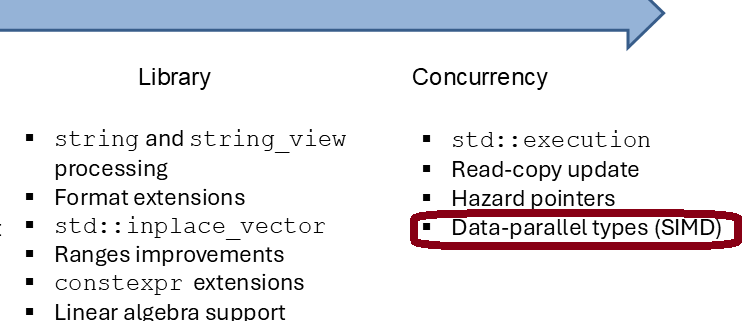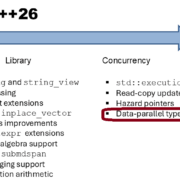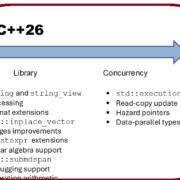Data-Parallel Types – A First Example
After providing a theoretical introduction to the new C++ 26 feature in my last article, “Data-Parallel Types (SIMD),” I would like to follow up today with a practical example.

The following introductory example is from the experimental implementation of the SIMD library. This functionality has been fully adopted in the C++ 26 draft under the name Data-parallel types (SIMD). To port the program to the C++ 26 standard, it should be sufficient to replace the header <experimental/simd> with <simd> and the namespace std::experimental with std::datapar.
#include <experimental/simd> #include <iostream> #include <string_view> namespace stdx = std::experimental; void println(std::string_view name, auto const& a) { std::cout << name << ": "; for (std::size_t i{}; i != std::size(a); ++i) std::cout << a[i] << ' '; std::cout << '\n'; } template<class A> stdx::simd<int, A> my_abs(stdx::simd<int, A> x) { where(x < 0, x) = -x; return x; } int main() { const stdx::native_simd<int> a = 1; println("a", a); const stdx::native_simd<int> b([](int i) { return i - 2; }); println("b", b); const auto c = a + b; println("c", c); const auto d = my_abs(c); println("d", d); const auto e = d * d; println("e", e); const auto inner_product = stdx::reduce(e); std::cout << "inner product: " << inner_product << '\n'; const stdx::fixed_size_simd<long double, 16> x([](int i) { return i; }); println("x", x); println("cos²(x) + sin²(x)", stdx::pow(stdx::cos(x), 2) + stdx::pow(stdx::sin(x), 2)); }
Before I proceed with the program, I would like to introduce the output.

First, I would like to focus on the println and my_abs functions. The println function outputs the name and content of a SIMD vector, iterating through its elements. my_abs calculates the absolute value of each element in a SIMD vector with integers, using where to conditionally negate negative values.
The main function is much more interesting. In the SIMD vector a, each element is set to 1, whereas in the SIMD vector b, thanks to the lambda function, each element is initialized so that it has its index minus 2. By default, SSE2 instructions are used via const stdx::native_simd. These SIMD vectors are 128 bits in size. Now the arithmetic begins. Vector c is the element-wise sum of a and b, d is the element-wise absolute value of c, and vector e is the element-wise square of d. Finally, stdx::reduce(e) is used. This reduces vector e to its sum.
The expression const stdx::fixed_size_simd<long double, 16> x([](int i) { return i; }) is particularly interesting. It initializes the SIMD vector x with 16 long double values from 0 to 15. This is possible if the architecture is sufficiently modern and supports AVX-252. This applies, for example, to Intel’s Xeon Phi or AMD’s Zen 4 architecture. Similarly interesting is the line println(“cos²(x) + sin²(x)”, stdx::pow(stdx::cos(x), 2) + stdx::pow(stdx::sin(x), 2)). This calculates cos²(x) + sin²(x) for each element, which is 1 for all elements due to the trigonometric identity of Pythagoras. All functions in <cmath> except for the special mathematical functions for simd are overloaded. These include basic functions such as abs, min, and max. However, exponential, power, trigonometric, hyperbolic, and gamma functions can also be applied directly to SIMD vectors.
Now I would like to go into more detail about the width of the data type simd<T>.
Width of simd<T>
The width of the data type native_simd<T> is determined by the implementation at compile time. In contrast, the developer specifies the width of the data type fixed_size_simd<T>.
The class template simd has the following declaration:
template< class T, class Abi = simd_abi::compatible > class simd;
Here, T stands for the element type, which cannot be bool. The Abi tag determines the number of elements and their memory.
There are two aliases for this class template:
 Modernes C++ Mentoring
Modernes C++ Mentoring
Do you want to stay informed: Subscribe.
template< class T, int N > using fixed_size_simd = std::experimental::simd<T, std::experimental::simd_abi::fixed_size<N>>; template< class T > using native_simd = std::experimental::simd<T, std::experimental::simd_abi::native<T>>;
The following ABI tags are available:
scalar: storing a single elementfixed_size: storing a specified number of elementscompatible: ensures ABI compatibilitynative: most efficientmax_fixed_size: maximum number of elements guaranteed to be supported byfixed_size
What’s next?
After this initial example of data parallel types, I would like to take a closer look at their functionality in the next article.
Thanks a lot to my Patreon Supporters: Matt Braun, Roman Postanciuc, Tobias Zindl, G Prvulovic, Reinhold Dröge, Abernitzke, Frank Grimm, Sakib, Broeserl, António Pina, Sergey Agafyin, Андрей Бурмистров, Jake, GS, Lawton Shoemake, Jozo Leko, John Breland, Venkat Nandam, Jose Francisco, Douglas Tinkham, Kuchlong Kuchlong, Robert Blanch, Truels Wissneth, Mario Luoni, Friedrich Huber, lennonli, Pramod Tikare Muralidhara, Peter Ware, Daniel Hufschläger, Alessandro Pezzato, Bob Perry, Satish Vangipuram, Andi Ireland, Richard Ohnemus, Michael Dunsky, Leo Goodstadt, John Wiederhirn, Yacob Cohen-Arazi, Florian Tischler, Robin Furness, Michael Young, Holger Detering, Bernd Mühlhaus, Stephen Kelley, Kyle Dean, Tusar Palauri, Juan Dent, George Liao, Daniel Ceperley, Jon T Hess, Stephen Totten, Wolfgang Fütterer, Matthias Grün, Ben Atakora, Ann Shatoff, Rob North, Bhavith C Achar, Marco Parri Empoli, Philipp Lenk, Charles-Jianye Chen, Keith Jeffery, Matt Godbolt, Honey Sukesan, bruce_lee_wayne, Silviu Ardelean, schnapper79, Seeker, and Sundareswaran Senthilvel.
Thanks, in particular, to Jon Hess, Lakshman, Christian Wittenhorst, Sherhy Pyton, Dendi Suhubdy, Sudhakar Belagurusamy, Richard Sargeant, Rusty Fleming, John Nebel, Mipko, Alicja Kaminska, Slavko Radman, and David Poole.
| My special thanks to Embarcadero |  |
| My special thanks to PVS-Studio |  |
| My special thanks to Tipi.build |  |
| My special thanks to Take Up Code |  |
| My special thanks to SHAVEDYAKS |  |
Modernes C++ GmbH
Modernes C++ Mentoring (English)
Rainer Grimm
Yalovastraße 20
72108 Rottenburg
Mail: schulung@ModernesCpp.de
Mentoring: www.ModernesCpp.org






